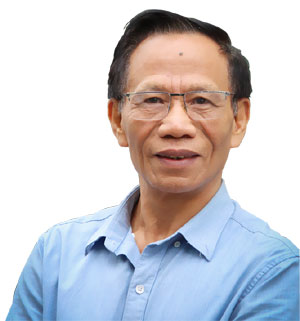 Economy
Economy

Hoàng Trọng Thủy, an agriculture expert, talks to the newspaper Kinh tế & Đô thị (Economic and Urban Affairs), on the important role of agriculture in national socio-economic development

|
| Hoàng Trọng Thủy, an agriculture expert. Photo kinhtedothi.vn |
Hoàng Trọng Thủy, an agriculture expert, talks to the newspaper Kinh tế & Đô thị (Economic and Urban Affairs), on the important role of agriculture in national socio-economic development
What is the role of the agriculture industry in the COVID-19 pandemic?
I want to talk about the role of our agriculture sector in three perspectives.
First, it meets the requirements of Vietnamese consumers nationwide.
Second, it is an important factor to balance the country’s nutrition requirements, particularly amid the current pandemic when everyone has tried to cut their spending.
And finally, it creates very good conditions for Vietnamese people to live in any circumstance which may occur.
Do you mean agriculture has played an important role in ensuring social security, not only for the economic sector but also the national economy?
Yes. Lessons learned in the past have shown that agriculture has always played a role as a primary industry in the Vietnamese national economy. Agriculture has played the role as a “midwife” for Việt Nam to develop sustainably. What’s more, the present COVID-19 pandemic is a test for Vietnamese agriculture - a mainstay in national politics, the people’s daily life and peace for the nation. Amid the outbreak of the pandemic, Vietnamese people have been supplied with sufficient food and other essential necessities.
COVID-19 has left strong negative impacts on Vietnamese agriculture in the first quarter of 2020. Do you have any comments on that?
In the first quarter of 2020, the Vietnamese agriculture sector was seriously hit by the COVID-19 pandemic, plus hailstones in the northern part of the country. Meanwhile, in the Mekong Delta, saline water intrusion has damaged thousands of hectares of orchards. Coupled with that, bird flu also hit many localities. As a result, in the first quarter of 2020, Việt Nam’s agro, forestry and fish exports have been seriously hit. It is reported that export losses due to the COVID-19 pandemic would be about 6.9 per cent.
However, we hope the pandemic will subside and the people’s demand for food will return to the normal rate from before the COVID-19 outbreak.
I’m also confident that when the pandemic has subsided, Việt Nam will resume its rice exports and this year, the country will export between 6- 6.7 million tonnes of rice.
What should Việt Nam do to promote agricultural production in the context of COVID-19?
In the context of the COVID-19, quite large areas have not been planted with rice. So I suggest farmers plant subsidiary crops instead of rice. It is time for co-operatives to help their members apply advanced technology in their production.
Farmers should then be advised on how to conserve their products to make sure that they will earn high prices.
The COVID-19 pandemic has impacted the supply chain. What should Việt Nam do to restore the normal consumption market for agricultural products?
Most countries still focus on measures to fight the COVID-19 pandemic so the agricultural sector should target the domestic market to serve local customers. It is high time for close co-operation between enterprises, supermarkets and big trade centres to work together to buy farmers’ products. I’m sure this is the best way to bring benefits to all sides.
For agriculture export products, it is necessary to have codes of their production zone to help buyers retrieve product origins. I think the COVID-19 pandemic will be an opportunity for Việt Nam to review and adopt a new way of production and business to raise the value of our agriculture products. VNS




